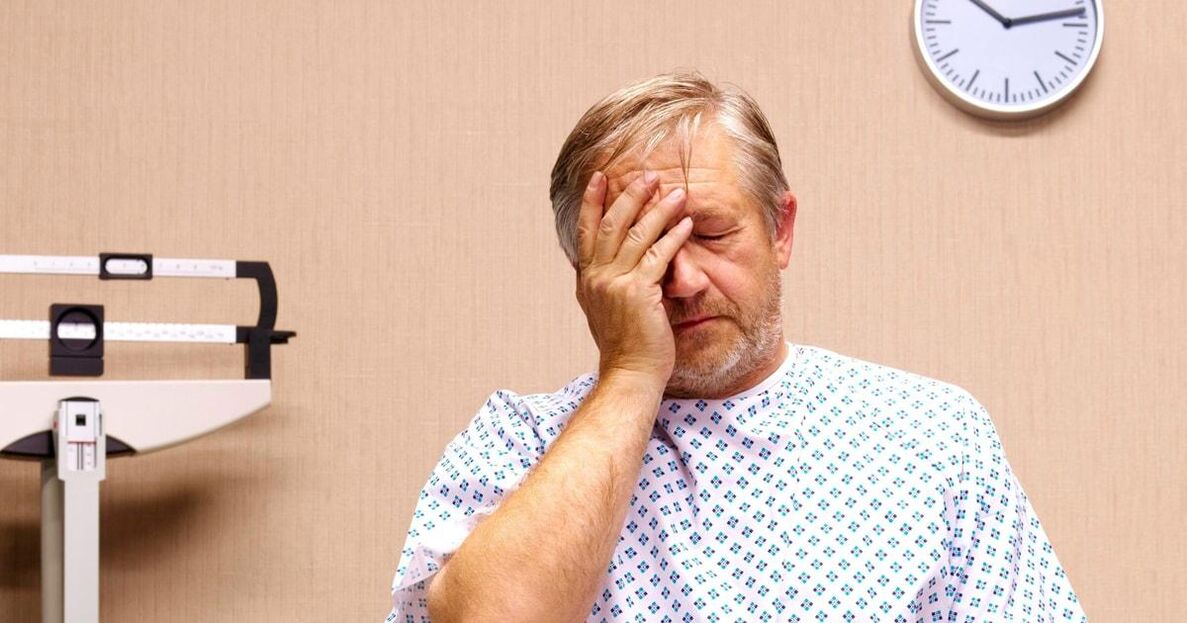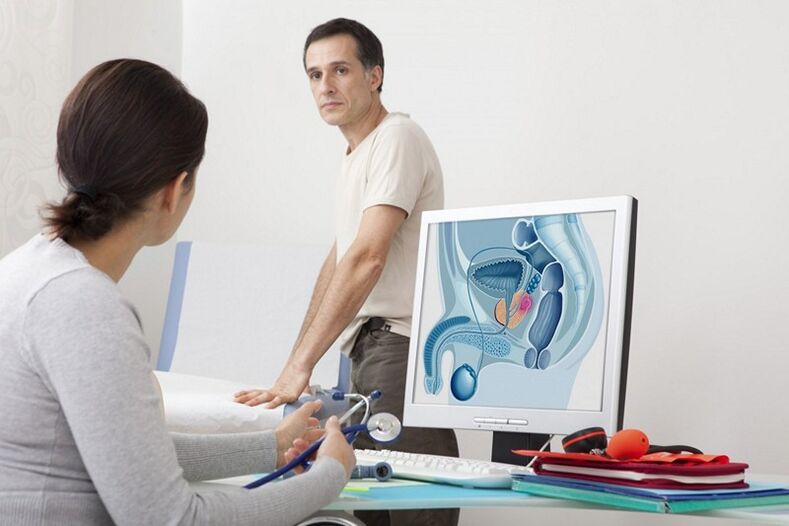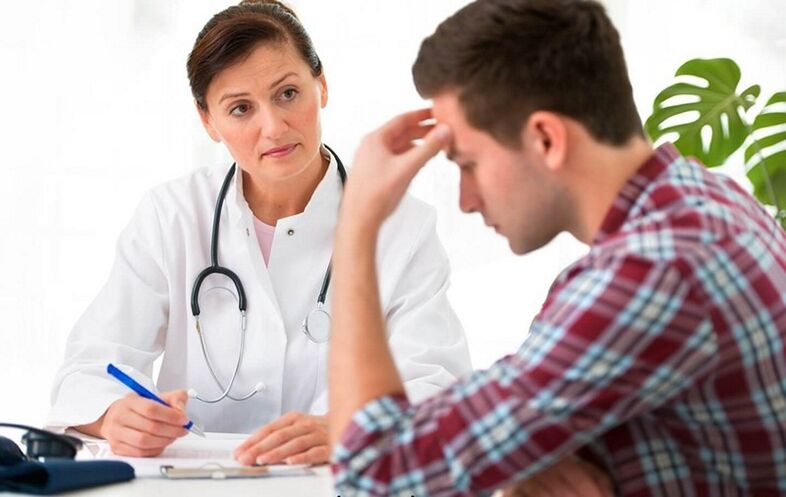One of the most common diseases in men is prostatitis. In any case, you should not delay its treatment because the prostate plays an important role and its inflammation can be excited by a dangerous infection. How do the symptoms of male prostatitis manifest?

Below we'll tell you what signs to identify this disease with and consider its treatment.
signs of disease
Generally, there are three types of pain symptoms:
- Genitourinary diseases. It was accompanied by a wound in the groin area while urinating and the constant urge to go to the toilet. Blood expulsion is possible. urination occurs in small parts;
- Sexual dysfunction. It is accompanied by tube, rectal pain during ejaculation. Potency also decreases, frequent discharge, and loss of orgasm. erections are also decreased or absent at all;
- Nervous system disorders. They are accompanied by apathy, aggression, psychological and emotional distress.
disease type
chronic prostatitis
In chronic prostatitis, symptoms become apparent only when they get worse. During remission, there are no symptoms. During the course of the disease, elevated body temperature, joint pain, increased sweating, insomnia, loss of appetite, lethargy, fever, chills. Headaches are not ruled out.
This type of disease occurs when a fungus or virus enters the lower pelvic organs. Representatives of this fauna are Escherichia coli, Staphylococcus, Chlamydia. It's worth noting that Helicobacter pylori is not included in the list of causes - this is natural as it does not cause prostatitis.
Of course, each of us has disease-causing microbes. However, the human body is designed in such a way that the immune system prevents them from multiplying. Therefore, if the protective function is compromised, the man can easily become a hostage of the inflammatory process. At the first symptom, you need to see a doctor. He will perform a rectal exam, perform the necessary tests and prescribe a course of treatment.
bacterial prostatitis
This disease is caused by pathogenic bacteria. The symptoms are the same as those of chronic prostatitis. Bacterial prostatitis most often evolves into a chronic form. This inflammation requires comprehensive treatment. Only the general effect of drugs, prostate massage and other physiotherapy procedures can prevent the disease from flowing into the chronic phase.
A competent urologist will prescribe antibiotics. They destroy all pathogenic microorganisms. It is very important to see your doctor on time. Do not stop taking the medicine after the condition improves, because it will worsen the condition and suffer from this disease for many years.
sclerosing prostatitis
Sclerosing prostatitis manifests in people who have persistent constipation and who take certain medications. The disease manifests as prostate reduction and tissue thickening -- a disease that is incurable.
prostatitis
The cause of the prostate disease type of the disease has not been elucidated. It is accompanied by groin pain. Treatments are individually assigned to patients.
nonbacterial prostatitis
Development of non-bacterial prostatitis due to semen stagnation and circulatory disturbance. However, the most common cause is zinc deficiency. It is an important part of the male reproductive system. Zinc is responsible for the correct production of hormones, potency, and reproductive function of the body.
The disease is accompanied by a pulling sensation in the groin, lower abdomen, and perineum. Sometimes pain in the back and tailbone is felt. This can go on for several months. During treatment, anti-inflammatory and hormonal medications, as well as herbal remedies, are prescribed.
asymptomatic prostatitis
Asymptomatic prostatitis is characterized by the absence of any symptoms as the disease progresses. Unfortunately, the disease is already manifested in its advanced stages. At this time, the prostate gland is greatly enlarged and urination is impaired. To determine disease, urine is analyzed for bacteria and white blood cells. This prostatitis often becomes chronic.
If you don't have an erection in the morning and have frequent urges in the dark, then this is an indication of the onset of the disease.
Prompt treatment should not be ignored, as prostate inflammation may become chronic. It can also cause bladder damage, making it difficult for you to go to the toilet. Indifference to health threatens infertility, abscesses, cystitis, and sepsis. Some consequences can only be cured in actionable ways.
Do not attempt to treat without expert help. Consult your healthcare professional before using any method.
Is prostatitis contagious? How to treat?
Sexual life with prostatitis is not prohibited. After all, it was her absence that caused the disease. The presented disease was only associated with the stronger sex. However, semen contains components that cause inflammation. Therefore, if such sperm enter the female reproductive organs, it may cause serious problems with female reproductive function. It is very important to protect yourself and maintain a healthy lifestyle.
prostate massage
This method of treating prostatitis is prescribed as a concomitant therapy. Also, massage is a great way to prevent disease. With its help, urologists can understand what stage the tumor is in. Massaging the prostate helps prevent sperm buildup, a common cause of inflammation.
This process relaxes the glands, improves blood circulation and oxygenates the organs. It also relieves unpleasant symptoms, uncomfortable feelings, prevents the development of cancer and normalizes urination.
Urology treatment
When you go to the clinic, you will most likely receive prescription drugs or surgery. It all depends on the stage of the disease.

Take this medicine only on the advice of a specialist, as some medicines have many contraindications.
If the disease does not respond to medical therapy, the patient is referred for surgery. The most common method is transurethral resection. During this procedure, the tumor is removed through the urethra. Most of the time, this type of surgery is performed at an intermediate stage of disease development, in the absence of infectious lesions. This type of intervention does not preserve sexual function.
The best solution is a minimally invasive approach. With this method, a puncture is made in the skin and then damaged tissue is removed in the bladder. Among the advantages, however, is the low likelihood of injury and infection penetration and no complications. This surgery can be done at any stage of the disease.
suggestion
Special attention should be paid to nutrition. Try to eliminate fatty, heavy, spicy and fried foods from your diet forever. Don't overuse flour products, pastries and pickles. Adjust your menu. Eat only healthy and whole foods, including vegetables and fruits, nuts, lean meats, dried fruits, and freshly squeezed juices.
Avoid alcoholic beverages, coffee, eggs, fatty meats and mushrooms. Forget greasy soups, hot spices, carbonated drinks.
Relax with herbal teas like chamomile. It perfectly deals with inflammation, removes toxins, aids the function of the kidneys and liver, and restores metabolism. Of note is the need for physical activity. Light exercise, swimming in the pool, walking in the morning, and following a special diet can help prevent prostate disease.

If you have experienced prostatitis once, visit your urologist once a year. This is necessary to monitor your condition and prevent disease recurrence.





























